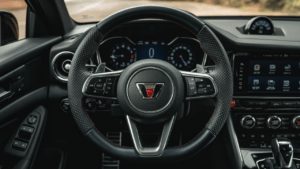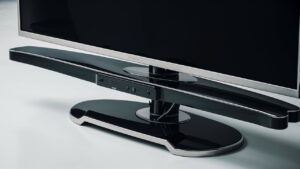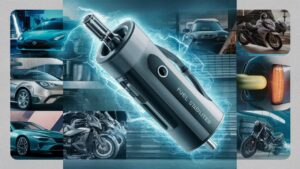When deciding between gas and electric pressure washers, it’s essential to understand their differences. Both types have unique advantages and drawbacks.
Pressure washers, whether gas or electric, are powerful cleaning tools. They can tackle tough grime on driveways, decks, and cars. But, noise levels, mobility, and power vary between these two types. Gas pressure washers are known for their strength and portability.
Electric pressure washers are often quieter and easier to maintain. Understanding these factors helps you choose the right tool for your needs. This comparison will guide you through the key aspects, making your decision easier and more informed.
Noise Levels
Gas pressure washers tend to be noisier compared to electric models. Electric pressure washers operate more quietly, making them suitable for residential areas.
Understanding the noise levels between gas and electric pressure washers can help you make the right choice for your needs. Whether you’re concerned about disturbing your neighbors, or you just want a quieter experience, noise levels are a critical factor to consider. Let’s dive into how gas and electric pressure washers measure up in this aspect.
Gas Pressure Washers
Gas pressure washers are powerful, but they come with a significant downside: noise. Imagine firing up a gas engine in your backyard. The sound can be quite loud, comparable to a lawnmower. This could be disruptive, especially if you live in a residential area.
Noise levels can range between 85 to 100 decibels. To put that in perspective, prolonged exposure to sounds above 85 decibels can cause hearing damage. You might want to wear ear protection when using a gas pressure washer.
Electric Pressure Washers
Electric pressure washers, on the other hand, are much quieter. If you prefer a less noisy experience, this could be your best bet. They typically operate at noise levels around 70 to 80 decibels. This is comparable to the noise level of a vacuum cleaner.
You can use an electric pressure washer without worrying too much about disturbing your neighbors. Plus, you won’t need ear protection. The quieter operation makes it ideal for residential areas and for those who prefer a more peaceful cleaning experience.
When choosing between gas and electric pressure washers, consider how important noise levels are to you. Do you value a peaceful environment, or is power your main concern? Your answer will guide you to the right choice.
Mobility Features
Gas pressure washers offer better mobility with no need for power outlets. Electric models are lighter and easier to maneuver.
When choosing a pressure washer, understanding the mobility features can make a significant difference in your cleaning experience. Whether you’re tackling your driveway, deck, or car, the ease of moving your equipment around will impact your efficiency and overall satisfaction. Let’s dive into the portability aspects of both gas and electric pressure washers to help you make an informed decision.
Portability Of Gas Models
Gas pressure washers are known for their robust performance, but how do they fare in terms of portability?
Typically, gas models are heavier and bulkier due to their powerful engines and larger fuel tanks. This can make them more challenging to maneuver, especially if you need to move them over uneven terrain or up and down stairs.
However, many gas pressure washers come equipped with sturdy wheels and handles, designed to offset their weight. The wheels are often pneumatic, making it easier to roll the washer over rough surfaces. If you frequently work in large outdoor areas, the mobility features of a gas model can be a lifesaver.
Portability Of Electric Models
Electric pressure washers, on the other hand, are generally lighter and more compact. This makes them easier to carry and store, particularly if you have limited space in your garage or shed.
One of the standout features of electric models is their plug-and-play simplicity. Since they don’t have a fuel tank, you won’t need to worry about gasoline spills or refills. Just plug it into an outlet, and you’re ready to go.
However, the need for a power outlet can limit your range. Extension cords can help, but they might not be practical for very large areas. If you plan to clean smaller, more accessible spaces, an electric model’s portability will serve you well.
Ultimately, your choice between a gas and electric pressure washer will depend on your specific mobility needs. Do you prioritize power and are willing to handle a bit more weight? Or do you prefer the lightweight convenience and ease of use that comes with an electric model?
Power And Performance
When choosing between gas and electric pressure washers, the power and performance are crucial factors to consider. Each type has its own strengths, making them suitable for different tasks. Let’s dive into the details of their cleaning capabilities.
Cleaning Power Of Gas Washers
Gas pressure washers pack a punch when it comes to cleaning power. They are typically more powerful than their electric counterparts, making them ideal for heavy-duty tasks. With higher PSI (pounds per square inch) and GPM (gallons per minute), gas washers can handle tough stains and large surfaces with ease.
Imagine cleaning a grimy driveway or a moss-covered deck. A gas washer can blast away dirt and grime quickly, saving you time and effort. However, this power comes with a trade-off. Gas washers are often louder and require more maintenance.
Have you ever struggled with stubborn oil stains on your garage floor? A gas pressure washer could be the solution you need. Its high pressure can penetrate deep into the surface, leaving it spotless.
Cleaning Power Of Electric Washers
Electric pressure washers, on the other hand, are perfect for lighter, everyday cleaning tasks. They generally have lower PSI and GPM, which makes them suitable for cleaning cars, patio furniture, and small decks. They are quieter and easier to maintain compared to gas washers.
Think about washing your car on a Sunday afternoon. An electric pressure washer provides the right amount of power without risking damage to the paint. Plus, their lightweight and compact design make them easy to maneuver and store.
Are you concerned about cleaning delicate surfaces like outdoor furniture or windows? Electric washers offer a gentler yet effective cleaning solution. They are less likely to cause damage while still providing a thorough clean.
Ultimately, the choice between gas and electric pressure washers boils down to your specific needs. Consider the type of tasks you’ll be performing and the level of power required. What kind of surfaces do you clean most often? How much power do you really need?

Fuel And Energy Sources
Pressure washers need power to work efficiently. There are two main types: gas and electric. Each type has its fuel source. This affects performance, convenience, and noise levels. Understanding the fuel and energy requirements can help you make a better choice.
Gasoline Requirements
Gas pressure washers need gasoline to run. This means you need to buy and store fuel. Gasoline is easy to find. However, it can be costly over time. Gas engines are powerful. They can handle tough jobs and large areas.
Using gas pressure washers also means dealing with fumes. Gas engines produce exhaust. It’s important to use them in well-ventilated areas. Maintenance can be more complex. Regular checks and tune-ups are necessary.
Electricity Requirements
Electric pressure washers need a power source. They plug into standard outlets. This makes them more convenient for home use. You don’t need to buy or store fuel. Just plug in and go.
Electric models are quieter than gas ones. They produce less noise and no fumes. This makes them ideal for indoor use or close to neighbors. Maintenance is simpler. They require fewer tune-ups and less upkeep.
Electric pressure washers may have less power than gas ones. They are best for smaller tasks. Light cleaning jobs and delicate surfaces are ideal. Consider the size and type of cleaning tasks before choosing.
Maintenance Needs
Regular maintenance keeps your pressure washer in top shape. Different models have different needs. Knowing what each type requires can save you time and money. Let’s explore the maintenance needs for gas and electric pressure washers.
Upkeep For Gas Washers
Gas pressure washers need regular attention. Check the oil levels before each use. Replace the oil every 50 hours of use or annually. Clean or replace the air filter periodically. Inspect the spark plug and change it if needed. Gasoline engines require fresh fuel. Drain the fuel tank if you won’t use the washer for a month. Regularly check hoses and connections for leaks. Clean the nozzle tips to ensure efficient water flow. Store the washer in a dry place to prevent rust.
Upkeep For Electric Washers
Electric pressure washers need less maintenance. Check the power cord for damage before use. Ensure the plug and socket are dry and clean. Inspect the hoses and connections for leaks. Clean the nozzle tips often. Electric models do not need oil changes or fuel. Store the washer in a dry, safe place. Protect it from freezing temperatures to avoid damage. Regular care extends the washer’s life and keeps it working efficiently.
Environmental Impact
Gas pressure washers often produce more noise than electric ones. Electric washers are lighter and easier to move. Gas models generally offer higher power levels.
### Environmental Impact
When choosing between gas and electric pressure washers, it’s essential to consider their environmental impact. This aspect is often overlooked but can make a significant difference in your long-term decision. Let’s dive into how gas and electric models affect our environment.
###
Emissions From Gas Models
Gas pressure washers emit exhaust gases, including carbon monoxide and nitrogen oxides. These emissions contribute to air pollution and can harm your health. If you’re using a gas model in a poorly ventilated area, this becomes even more concerning.
Using a gas pressure washer for long hours can increase your carbon footprint. The noise pollution from gas models can also disturb your neighbors and wildlife. Think about these factors before opting for a gas model.
###
Eco-friendliness Of Electric Models
Electric pressure washers don’t emit harmful gases. They operate quietly, making them a better choice for residential areas. This can be a huge benefit if you live in a place where noise regulations are strict.
Electric models also have a smaller carbon footprint. Most electricity is generated from renewable resources, reducing your environmental impact. They are ideal for small to medium tasks, providing a greener way to keep things clean.
Have you ever thought about how your choice of a pressure washer could affect the environment? Next time you decide, consider the green benefits of an electric model.
Cost Considerations
Gas pressure washers usually cost more upfront, but offer greater power and mobility. Electric models are cheaper, quieter, and easier to maintain.
When deciding between gas and electric pressure washers, it’s essential to consider the cost. The financial aspect isn’t just about the initial purchase but also the long-term expenses. Let’s break down the cost considerations for both types of pressure washers.
Initial Purchase Price
Gas pressure washers generally come with a higher price tag upfront. They are powerful machines, often designed for heavy-duty tasks.
Electric pressure washers, on the other hand, are usually more affordable. They are perfect for lighter cleaning tasks around the home.
Imagine needing to clean your driveway a few times a year. An electric model might suffice and save you some cash initially.
Long-term Operating Costs
Operating costs can vary significantly between gas and electric pressure washers. Gas models require fuel, regular maintenance, and sometimes oil changes. These costs add up over time.
Electric models are more cost-effective in the long run. They use electricity, which is typically cheaper than gas. Plus, they require less maintenance.
Think about your typical usage. If you use your pressure washer frequently, the cost of fuel for a gas model can become a significant expense.
Consider the environmental impact as well. Electric pressure washers are generally more eco-friendly, which can be a deciding factor for many homeowners.
In summary, while a gas pressure washer might seem like a good investment for its power and mobility, the long-term costs can be higher. An electric model, though less powerful, can save you money over time with lower operating costs.
Which pressure washer fits your budget and needs better?
User Experience
The user experience with pressure washers can significantly impact your satisfaction with the product. The ease of handling, noise levels, and mobility all play essential roles in how you interact with your pressure washer. Let’s break down the experience of using gas and electric pressure washers to help you make an informed choice.
Handling Gas Washers
Gas pressure washers are known for their power. But with great power comes great responsibility. Handling a gas washer can be a bit of a workout.
They are heavier and bulkier, which can make maneuvering them around your yard challenging. But if you need to clean large areas, the extra power can be worth the effort.
Another aspect to consider is the noise. Gas washers are loud. If you have close neighbors or prefer a quieter environment, this might be a deal-breaker. Ear protection is recommended.
Handling Electric Washers
Electric pressure washers, on the other hand, are much easier to handle. They are lightweight and more compact, making them ideal for smaller cleaning tasks.
The mobility of electric washers is a significant advantage. You can easily move them around without much hassle. Plus, they start up with a simple switch, no pulling cords required.
Noise is another area where electric washers shine. They operate much quieter than their gas counterparts. This makes them a better choice for residential areas where noise can be an issue.
So, which one suits your user experience needs better? Think about your typical cleaning tasks and environment. If power and heavy-duty cleaning are your top priorities, a gas washer might be your best bet. However, if ease of use and noise levels are more important, an electric washer could be the perfect fit.
Frequently Asked Questions
Are Electric Pressure Washers Quieter Than Gas?
Yes, electric pressure washers are quieter than gas models. They produce less noise and are ideal for residential areas.
What Are The Disadvantages Of Electric Pressure Washers?
Electric pressure washers have limited mobility due to the power cord. They offer less power compared to gas models. They require an electrical outlet, limiting where they can be used.
Are Electric Pressure Washers Loud?
Electric pressure washers are generally quieter than gas models. They produce noise levels around 70-90 decibels.
Are Electric Pressure Washers Powerful?
Yes, electric pressure washers are powerful. They effectively clean surfaces like driveways, decks, and vehicles, providing high water pressure.
Conclusion
Choosing between gas and electric pressure washers depends on your needs. Gas models offer power and mobility. They handle tough jobs well. Electric washers are quieter and easier to maintain. They suit smaller tasks. Consider the noise, portability, and power required.
Both types have their strengths. Evaluate your specific requirements and budget. Make an informed decision for the best cleaning results.








